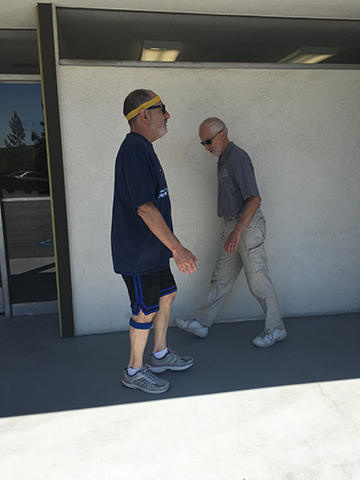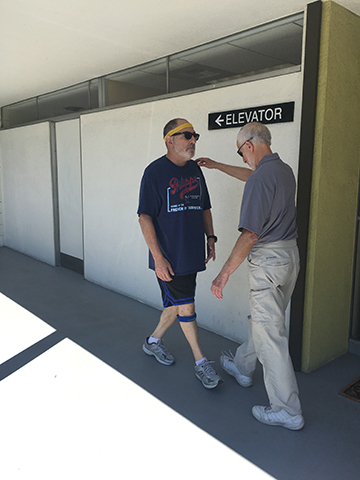Vestibular Therapy
- One in every three persons age 65 and older falls each year.
- Falls are the leading cause of injury and accidental death in those over the age of 85.
- In 2005, 15,800 people age 65 and older died from injuries related to unintentional falls.
- About 1.8 million people age 65 and older were treated in emergency rooms for injuries sustained from falls (CDC 2008).
Some of the risk factors associated with falls include:
- Older Age
- Muscle Weakness
- A History of Falls
- Medical Conditions Such as Diabetes, Arthritis, Stroke, Walking Problems and Fear of Falling
Do you have a vestibular dysfunction?
If you have a vestibular dysfunction, our team of licensed therapists will perform a comprehensive, one-on-one evaluation to pinpoint the specific cause of your vestibular/balance problem. You are not alone. According to the CDC, more than one third of adults 65 and older fall each year in the United States and 20% to 30% of people who fall suffer moderate to severe injuries.
We can help reduce and maybe even prevent falls by:
- Assessing your risk of falling
- Helping you make your home as safe as possible
- Educating you about the medical risk factors linked to falls
- Designing individualized exercises and balance training
- Working with other health care professionals and community services to create programs for you to reduce your risk of falling
Do not ignore the symptoms
If you have vertigo, dizziness or another vestibular system dysfunction, ignoring your symptoms can put you in danger of a fall, which could result in a serious injury.
Symptoms include:
- Dizziness (lightheadedness)
- Imbalance and Spatial Disorientation
- Nausea/Vomiting
- Unsteadiness/Falls
- Vision or Hearing Disturbances/Changes
- Cognitive and/or Psychological Changes
- Vertigo (room is spinning)
- Vestibular Migraine - also known as Migraine Associated Vertigo (MAV)
- Headaches
- Slurred Speech
- Sensitivity to Pressure or Temperature Changes and Wind Currents
- Pain, Pressure or other Symptoms with Certain Dietary Changes (e.g., high sodium)
If you are feeling any of these or other symptoms that may be associated with the vestibular system, call us as soon as possible at (818) 790-3001 to set up an appointment.
Getting to the root cause...
Your vestibular system is responsible for supplying the brain with crucial information about your balance and steadiness. Vestibular system problems can leave you feeling nauseated or unbalanced.
Benign Paroxysmal Positional Vertigo (BPPV) is the most common vestibular disorder. It is a mechanical disorder in your inner ear that causes vertigo (dizziness). The reason for this is because some of the calcium carbonate crystals (otoconia) that are normally embedded in gel in the utricle become dislodged and migrate into one or more of the 3 fluid-filled semicircular canals, where they are not supposed to be. This causes the inner ear to send false signals to the brain. If BPPV can be ruled out, it does not mean you do not have a vestibular system dysfunction. We will check for a wide array of possible problems during your initial evlauation.
Your initial evaluation will consist of:
- Fall Risk
- Strength
- Balance
- Medical History (including other medical issues and information about medications)
- Hearing or Vision Problems
- History of Falls
- Previous and Current Activity Level
- Your Living Situation
- Laboratory Tests
- Other Tests, if Necessary
At DSC Physical Therapy, we'll find the problem and set up a plan of care to get you back on your feet and enjoying your favorite activities.
Vestibular Rehabilitation Therapy (VRT)
Your initial evaluation will include findings of our clinical assessment, results from laboratory testing and imaging studies, and input from you about your goals for rehabilitation. Then, your therapist will provide you with a custom VRT treatment program, which may involve one or more of these techniques:
- Strengthening Exercises
- Flexibility Exercises
- Gait Training
- Patient Education Safety Awareness
- Transfer Exercises
- Balance Exercises
- Vestibular Testing
In addition to designing your custom treatment plan, we will provide you with a home exercise program to complement your care, which can include:
- Gaze stabilization exercises, improve control of eye movements so vision can be clear during head movement, and
- Balance Training exercises are used to improve steadiness to improve the quality of daily activities for self-care, work and leisure.
Compliance with the home exercise program is essential for achieving your goals of being able to manage your condition on your own and return to your normal activities.
Getting You Back to the Things You Love to Do
Sometimes, we can resolve your condition with just one visit! Other times we will need to design a more long-term plan for your condition. Whether your condition only requires one visit or several, you can rest assured that our Balance and Vestibular Program is evidence-based. Our therapists actively participate in continuing education, so you know that you are receiving the most up-to-date and cutting-edge treatment methods.
Knowledge is Power
Patient education is emphasized by our staff so you understand your diagnosis, the cause of your condition and how to maintain control over it. The information we provide about how to deal with vestibular difficulties and what can be expected from VRT can help take away a lot of the mystery of your experiences, which can help reduce the anxiety associated with your condition and help you improve faster. We also maintain constant coordination and communication with your physician, so he or she remains in the loop on your diagnosis and treatment plan at all times.
How We Can Help
If you feel as though you may be suffering from a balance or vestibular issue or if your physician has prescribed balance or vestibular therapy, please contact us at (818) 790-3001 to set up an appointment. In many cases, you can be treated without a referral.

